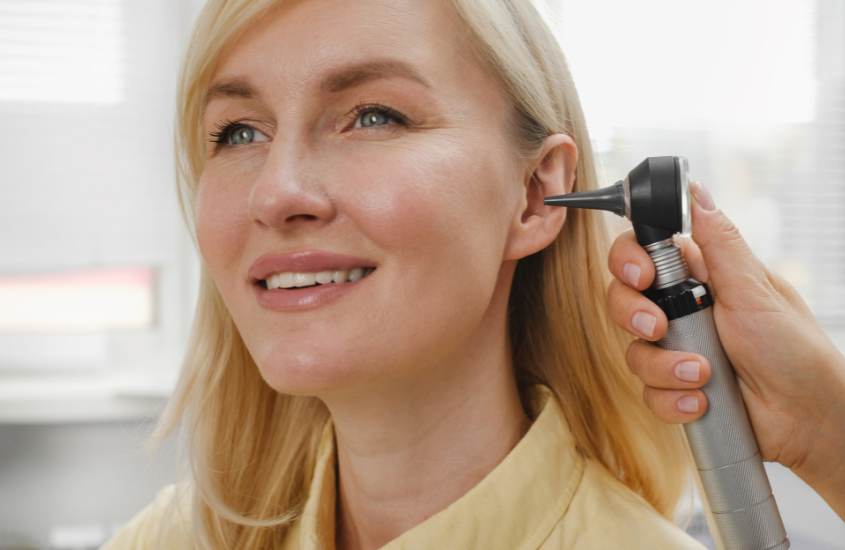High-pitched ringing in the right ear, also known as tinnitus, is a common condition affecting many individuals. This persistent noise can be both annoying and disruptive, impacting daily activities and overall quality of life. Understanding the causes and finding effective solutions are crucial steps in managing this condition. Exposure to loud noises, ear infections, and age-related hearing loss are among the common causes. Additionally, certain medications and underlying medical conditions, such as Meniere’s disease, can contribute to tinnitus. Recognizing the symptoms and seeking professional help are essential for proper diagnosis and treatment.
Various diagnostic procedures, including hearing tests and imaging, can help identify the underlying cause of tinnitus. Once diagnosed, a range of treatment options are available to alleviate the symptoms. Medical treatments, hearing aids, and sound therapy are commonly used methods. Lifestyle changes, such as reducing stress and avoiding loud environments, can also make a significant difference. In some cases, alternative treatments may provide relief. Preventative measures, like regular hearing check-ups and ear protection, are essential for maintaining ear health. By understanding the causes and exploring various solutions, individuals can effectively manage high-pitched ringing in the right ear and improve their quality of life.
Common Causes of High Pitched Ringing in the Right Ear
High-pitched ringing in the right ear, commonly known as tinnitus, can arise from various causes, with prolonged exposure to loud noises being a primary factor. Activities such as attending concerts, using heavy machinery, or listening to music at high volumes through headphones can damage the delicate hair cells in the inner ear. This damage can lead to persistent ringing or buzzing sounds. Age-related hearing loss, known as presbycusis, also contributes to tinnitus, as the natural aging process can deteriorate the auditory system, resulting in abnormal ear noises. Moreover, ear infections and earwax buildup can obstruct the ear canal, creating pressure and leading to tinnitus symptoms.
Certain medications, including high doses of aspirin, antibiotics, and diuretics, have been linked to tinnitus as a side effect. Meniere’s disease, a disorder of the inner ear, causes vertigo, hearing loss, and tinnitus due to fluid buildup and pressure changes in the ear. Additionally, underlying health conditions such as high blood pressure, diabetes, and cardiovascular diseases can affect blood flow to the ears, exacerbating tinnitus. Understanding these common causes is crucial for effective management and treatment of high-pitched ringing in the right ear, as addressing the underlying issue often alleviates the symptoms.

Identifying Symptoms and When to Seek Help
Identifying the symptoms of high-pitched ringing in the right ear is crucial for timely intervention and treatment. Commonly known as tinnitus, this condition manifests as a persistent ringing, buzzing, or hissing sound that can vary in intensity and frequency. It is essential to pay attention to when these sounds occur and whether they are constant or intermittent. Accompanying symptoms might include ear pain, dizziness, or hearing loss, which could indicate an underlying health issue. Recognizing these signs early can lead to more effective management and potential alleviation of the discomfort associated with tinnitus.
Knowing when to seek professional help for tinnitus is equally important. If the high-pitched ringing in your ear persists for more than a few days or is accompanied by other symptoms like vertigo, significant hearing loss, or severe pain, it is vital to consult a healthcare provider. Early diagnosis can help rule out serious conditions such as ear infections, auditory nerve damage, or even tumors. A healthcare professional can perform necessary diagnostic tests and recommend appropriate treatment options, ranging from medication to sound therapy. Taking prompt action can significantly improve your quality of life and prevent further complications related to tinnitus.
See also: Best Rangefinder
Diagnostic Procedures
Diagnostic procedures for high-pitched ringing in the right ear involve various tests to identify underlying causes accurately. Audiologists conduct comprehensive hearing evaluations, including pure-tone audiometry, to assess hearing sensitivity across different frequencies. They may also perform tympanometry to evaluate middle ear function and assess the mobility of the eardrum. Additionally, otoacoustic emissions testing measures the function of the cochlea, while auditory brainstem response testing evaluates the functioning of the auditory nerve and brainstem pathways. These tests help audiologists determine the extent and nature of hearing loss and identify any abnormalities contributing to tinnitus.
Furthermore, imaging tests such as magnetic resonance imaging (MRI) or computed tomography (CT) scans may be recommended to visualize the structures of the ear and head in detail. These imaging modalities can help detect abnormalities such as tumors or structural issues that may be causing the high-pitched ringing. Through a combination of these diagnostic procedures, healthcare providers can formulate an accurate diagnosis and develop an individualized treatment plan to address the underlying causes of the condition, leading to improved management and relief of symptoms for the patient.
Treatment Options
A range of treatment options exists for addressing high-pitched ringing in the right ear. Firstly, medical interventions may include prescribed medications aimed at alleviating symptoms. These medications can target underlying conditions such as infections or inflammation, providing relief and improving overall ear health. Additionally, certain therapies like cognitive behavioral therapy (CBT) may help manage the emotional distress often associated with tinnitus, offering coping strategies and enhancing quality of life.
Moreover, hearing aids coupled with sound therapy offer effective solutions for managing tinnitus. These devices amplify external sounds while providing background noise or soothing sounds to mask the ringing sensation. Lifestyle modifications, such as reducing exposure to loud noises and managing stress levels, play a crucial role in managing tinnitus symptoms. Furthermore, alternative treatments like acupuncture or dietary supplements may complement conventional therapies, although their efficacy varies from person to person. By exploring these diverse treatment avenues, individuals can find personalized approaches to alleviate high-pitched ringing and regain control over their auditory well-being.

Preventative Measures
Preventative measures for high-pitched ringing in the right ear begin with protecting your ears from excessive noise exposure. Wearing earplugs at concerts, using noise-canceling headphones in loud environments, and maintaining a moderate volume when using earbuds can significantly reduce the risk. Regular breaks from continuous loud noises are also crucial in preventing auditory damage. Maintaining overall ear hygiene, such as gently cleaning your ears and avoiding inserting objects into the ear canal, helps prevent infections that could lead to tinnitus.
In addition to physical protection, adopting a healthy lifestyle can play a significant role in preventing high-pitched ringing in the ear. Managing stress through relaxation techniques like yoga, meditation, or deep-breathing exercises can reduce the likelihood of tinnitus, as stress is a common trigger. A balanced diet rich in vitamins and minerals supports overall ear health, while regular exercise improves blood circulation, which is vital for maintaining healthy auditory function. Regular hearing check-ups with an audiologist ensure early detection and management of potential hearing issues, allowing for prompt intervention before they escalate. By taking these preventative measures, you can significantly lower the chances of experiencing high-pitched ringing in your ears.
Conclusion
High-pitched ringing in the right ear, often caused by factors such as loud noise exposure, age-related hearing loss, or ear infections, can significantly impact daily life. Identifying the root cause through proper diagnosis is crucial for effective treatment. Medical interventions, including medication, hearing aids, and sound therapy, can provide substantial relief. Lifestyle changes and home remedies, such as reducing exposure to loud sounds and practicing stress management techniques, also play a vital role in managing symptoms.
Preventative measures, including regular hearing check-ups and protective strategies, can help maintain ear health and prevent the onset of tinnitus. It’s important to take proactive steps to protect your hearing and consult healthcare professionals when symptoms arise. By understanding the causes and solutions for high-pitched ringing in the right ear, individuals can take control of their auditory health, ensuring a better quality of life. More Details







